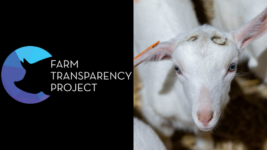Court Refuses Injunction to Prevent Publication of Footage Exposing Extreme Animal Cruelty in Abattoir

Federal Court Justice John Snaden ruled partially in favour of The Game Meats Company of Australia (GMC) on 19 December 2024, when he ordered that animal protection company Farm Transparency International (FTI) should pay it $130,000 in damages in regard to its having trespassed within its halal abattoir in the northeast Victorian regional town of Eurobin on a number of occasions this year.
However, the judge stopped short in issuing the injunction that GMC sought to prevent FTI from publishing video footage exposing “extreme animal cruelty” going on at the Eurobin site, despite that being the main aim of the civil suit.
On seven occasions over January and April this year, FTI agents committed trespass, when they entered into the Eurobin abattoir and it’s surrounds by cover of night and without permission, in order to install and then retrieve covert video recording devices.
FTI considers the treatment of animals in the meat-processing industry morally unjustifiable, and in exposing the horrors of slaughterhouses, it hopes to trigger a societal shift away from the mass slaughter of animals for human consumption.
In May, FTI then made an extreme animal cruelty complaint to the federal Department of Agriculture, Fisheries and Forestry (DAFF), which included footage.
But due to a lack of response, FTI then went to Channel Seven, which didn’t play the footage but reported its content on 17 May, and following this, FTI partially posted some footage on the internet, along with a 20 May statement.
GMC then sought to have an injunction imposed against FTI to stop it publishing footage from the Eurobin abattoir, as well as that the company should sign over the rights to it.
And the Federal Court of Australia issued a temporary restraining order, so that FTI could not post the footage until at least the findings of the case were delivered. And the hearings were held over 5 to 9 August and on 3 September.
The case at hand
In raising its 4 June 2024 claim, The Game Meats Company sought the injunction based on four points. The first was that the footage was obtained by illegal trespass on its property, while, secondly, FTI had engaged in deceptive behaviour under Australian Consumer Law (ACL), when it provided the footage to the television station and posted the video online.
The third point GMC asserted was that FTI’s behaviour comprised the tort of injurious falsehood, and hence, an injunction was warranted to prevent a repeat of this, and the meat company further sought to have the animal rights group sign over the copyright to the footage it captured inside its Eurobin abattoir.
In its defence, Farm Transparency International admitted the charges alleged against it. The animal welfare company further accepted that it should pay general damages as the court saw fit and added that exemplary damages might be warranted in relation to a tort.
Exemplary damages are those the court imposes in order to act as a punishment against a defendant.
FTI also maintained that an injunction was not warranted as such a measure is only ever justified in terms of extreme forms of trespass, while an injunction should not be available to GMC in order to protect it from the fallout from its own conduct, and it added that an injunction would also unjustifiably breach the implied right to political communication in the Australian Constitution.
“FTI otherwise denies that it is liable in tort or under the ACL in the ways that GMC alleges,” Justice Snaden explained. “Specifically, it maintains that none of its conduct to date has involved falsehood or deception, and that its publication of the footage that it obtained was – and, importantly, will be – understood merely as a means of publicising, accurately… events that transpired at” the abattoir.
Behind closed doors
Six FTI animal defenders testified, including Australian documentary director Chris Delforce, whose 2018 film Dominion, an exposé revealing the cruelties of the Australian animal agriculture industry, is globally renowned. And FTI employee Harley McDonald-Eckersall also testified.
The court heard that the 1996 established GMC Eurobin abattoir serves to slaughter and process mainly feral goat meat, with the animals being transported in from around NSW. And over the financial year 2021/22, the slaughterhouse generated $37 million.
GMC security cameras revealed that FTI had trespassed onto its site on seven occasions between 9 January and 13 April this year. Each of these acts of trespass involved Delforce and McDonald-Eckersall and on three occasions, a third person was involved.
Snaden further explained that it was “not controversial” that Delforce and McDonald-Eckersall installed video cameras in concealed locations throughout the abattoir, and at least some of the cameras were installed in the roof, which required drilling and the cutting of holes in the ceiling.
The initial footage captured involved 100 hours over 14 work shifts. This was then used to create a 14-minute film that McDonald-Eckersall forwarded to the DAFF in May.
The department then informed GMC about the footage, which the Federal Court judge described as “gruesome”.
McDonald-Eckersall set out in the DAFF complaint that the “severity” of animal welfare breaches being perpetrated against the goats within the abattoir “and their disturbing nature calls for nothing less than the immediate suspension of this slaughterhouse’s license to operate while an independent investigation takes place”.
And FTI explained in its May press release that the behaviour brought to the attention of the department and Channel 7 included hitting goats, the unsuccessful stunning of them, and their throats being slit while they were still conscious, as well as the abuse of baby goats.
Damages awarded, but no injunction
As Justice Snaden explained, GMC sought relief over the tort of trespass and that of injurious falsehood, and while relief was found to be warranted in terms of trespass, due to the factual nature of the footage and written publications released by FTI, there was no harmful untruths deserving any compensation and neither was malice found to be involved in these publications.
And while the judge did find general and exemplary damages were warranted, as for special damages, or those awarded due to quantifiable financial losses, there was no justification for any.
In terms of the injunction to prevent the publication of the 14-minute film, the Federal Court justice explained that it was possible to intervene in relation to injurious falsehoods, however as he did not find injury or malice, there was no reason to apply the injunction.
“FTI is correct to calculate that the footage that it has obtained at the Eurobin premises is footage that will assist it in turning people away from the consumption of meat processed by commercial operations such as GMC’s,” Snaden continued. But he added that as no falsehoods were involved, there was no reason to prevent this from happening.
However, if malice or injurious falsehood had been shown, the judge explained, an injunction would have been warranted, and that’s regardless of FTI’s contention around the constitutionally implied right to freedom of political expression. And the justice further found that the footage did not comprise of misleading or deceptive content as per Australian Consumer Law.
As for FTI having to sign over the copyright of the 14-minute film to GMC, Justice Snaden found there was no precedent for such an outcome on.
The judge further ordered that in terms of general damages, or compensation in relation to the trespass, GMC was owed $30,000, while as for exemplary damages, Snaden was clear that they were warranted for the “most obvious examples of intentional wrongdoing that one might imagine”, and he calculated $100,000 was warranted.
So, on the 19 December, Federal Court Justice Snaden awarded The Game Meats Company of Australia $130,000 in compensation, while refusing to impose an injunction against Farm Transparency International from being able to publish the 14-minute film that exposes what’s going on in regard to the slaughter of goats at the GMC Eurobin abattoir.







